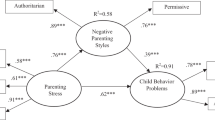Abstract
We conducted an evaluation of Nobody’s Perfect Program involving 71 participants from Peterborough County, Canada. Prior to the program, parents completed demographic information, along with self-report measures assessing the types of interactions with their children, parent resourcefulness, knowledge and use of resources, parent competency and self-efficacy, which were completed again after the program and at a two month follow-up testing. In comparison to parents not earning certificates, parents earning certificates were younger and more likely to have completed previous parenting programs. As well, parents earning certificates demonstrated and maintained an increase in parenting resourcefulness, warm/positive parent-child interactions, sense of parenting competency and satisfaction, and use of community resources. The more sessions parents attended, the better their parenting resourcefulness and warm/positive parent-child interactions on completion and at follow-up, and the less their angry and punitive parenting at follow-up. Parents who had attended parenting programs before had higher parenting resourcefulness scores at entry. They left the program with increased levels of parenting resourcefulness, better parent-child interactions, and more effective child management skills. A number of recommendations are suggested to help facilitators of the program enhance service delivery and improve parental outcomes.
Similar content being viewed by others
References
Britner, P. A., & Reppucci, N. D. (1997). Prevention of child maltreatment: Evaluation of a parent education program for teen mothers. Journal of Child and Family Studies, 6, 165–175.
Coleman, P. K., & Karraker, K. H. (1997). Self-efficacy and parenting quality: Findings and future applications. Developmental Review, 18, 47–85.
Collins, W. A., Maccoby, E. E., Steinberg, L., Hetherington, E. M., & Bornstein, M. H. (2000). Contemporary research on parenting, the case for nature and nurture. American Psychologist, 55, 218–232.
Crill Russell, C. (2003). Parenting in the beginning years: Priorities for investment. Toronto, ON: Invest in Kids.
Coren, E., Barlow, J., & Stewart-Brown, S. (2003). The effectiveness of individual and group-based parenting programmes in improving outcomes for teenage mothers and their children: A systematic review. Journal of Adolescence, 26, 79–103.
de Montigny, F., & Lacharité, C. (2005). Perceived parental efficacy: Concept analysis. Journal of Advanced Nursing, 49, 387–396.
Health Care Network of Health Canada. (2005). Nobody’s perfect http://www.hc-sc.gc.ca/hppb/healthcare/pubs/selfcare/4en.htm
Landy, S., & Tam, K. K. (1998). Understanding the contribution of multiple risk factors on child development at various ages. Applied Research Branch, Strategic Policy, Human Resources Development Canada, W-98-22E. Retrieved May 24, 2005, from http://www11.hrsdc.gc.ca/en/cs/sp/sdc/pkrf/publications/research/1998-000139/W-98-22E.pdf
MacLeod, J., & Nelson, G. (2000). Programs for the promotion of family wellness and the prevention of child maltreatment: A meta-analytic review. Child Abuse & Neglect, 24, 1127–1149.
Ohan, J. L., Johnston C., & Leung, D. W. Y. (2000). The parenting sense of competence scale: Evidence of a stable factor structure and validity. Canadian Journal of Behavioural Science, 32, 251–264.
Oldershaw, L. (2002). A national survey of parents of young children. Toronto, ON: Invest in Kids.
Orthner, D. K., Jones-Sanpei, H., & Williamson, S. (2004). The resilience and strengths of low-income families. Family Relations, 53, 159–167.
Patterson, G. R., & Forgatch, M. S. (1995). Predicting future clinical adjustment from treatment outcome and process variables. Psychological Assessment, 7, 275–285.
Rosenbaum, M. (2000). The self-regulation of experience: openness and construction. In P. Dewe, A. M. Leiter, & T. Cox (Eds.), Coping and health in organizations (pp. 51–67). London: Taylor & Francis.
Thomas, E.M. (2004). Aggressive behaviour outcomes for young children: change in parenting environment predicts change in behaviour. Catalogue no. 89-599-MIE—No. 001. Ottawa, ON: Statistics Canada.
Trocmé, N., Fallon, B., MacLaurin, B., Daciuk, J., Felstiner, C., Black, T., Tonmyr, L., Blackstock, C., Barter, K., Turcotte, D., & Cloutier, R. (2003). Canadian incidence study of reported child abuse and neglect—2003: Major findings. Ottawa, Ontario: Minister of Public Works and Government Services Canada.
Tucker, S., Gross, D., Fogg, L., Delaney, K., & Lapporte, R. (1998). The long-term efficacy of a behavioral parent training intervention for families with 2-year-olds. Research in Nursing and Health, 21, 199–210.
Walker, L. (1990). Parenting programs: they serve the needs of which parents? Unpublished thesis, Trent University, Peterborough, Ontario, Canada.
Wood Cantano, J. (2000). Working with Nobody’s Perfect: A facilitators guide (3rd ed.). Ottawa, ON: Minister of Public Works and Government Services, Canada.
Author information
Authors and Affiliations
Corresponding author
Rights and permissions
About this article
Cite this article
Chislett, G., Kennett, D.J. The Effects of the Nobody’s Perfect Program on Parenting Resourcefulness and Competency. J Child Fam Stud 16, 473–482 (2007). https://doi.org/10.1007/s10826-006-9098-x
Published:
Issue Date:
DOI: https://doi.org/10.1007/s10826-006-9098-x




